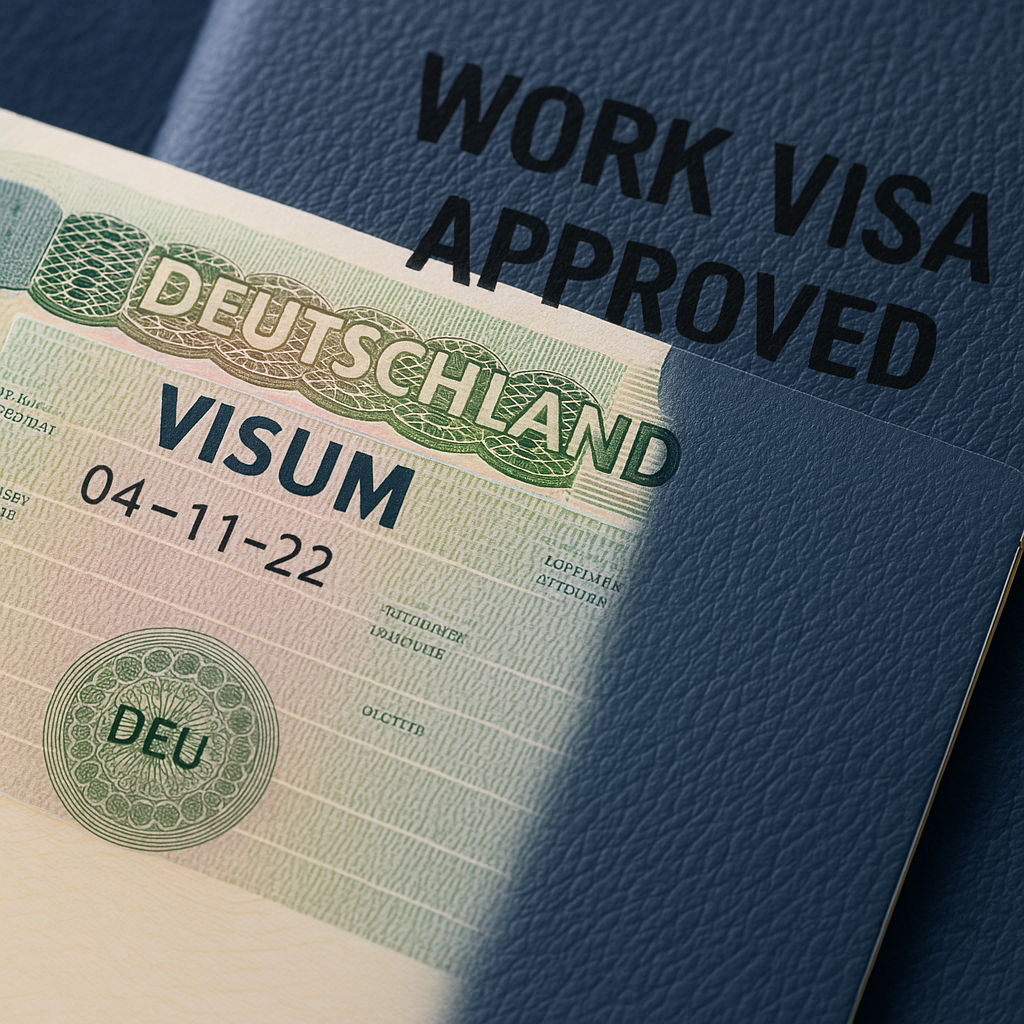Overview of the Germany Work Visa for Indians
The Germany work visa allows non-EU citizens, including Indians, to live and work legally in Germany. It’s for those who have a job offer from a German employer and the skills or qualifications to match the role.
For Indian applicants, the Germany work visa for Indian professionals covers far more than just office jobs. Germany urgently needs blue-collar workers — from electricians and plumbers to truck drivers, welders, and care assistants. These roles are in high demand across the country, and the job market is growing fast.
Because of this demand, many licensed European recruitment agencies are actively helping Indian workers find jobs and navigate the visa process. Employers are ready, and so are the agencies — they know there’s a serious labor shortage and are eager to fill positions quickly.
With fair wages, healthcare, strong labor laws, and a path to permanent residency, the German work visa offers a realistic and stable way to build a life in Europe.
Easy-to-Apply Visa Types in Germany for Indians
There are several visa types in Germany that allow non-EU nationals, including Indians, to work legally depending on their qualifications, job type, and employment status. Here’s a quick overview of the most common options:
EU Blue Card
Ideal for highly qualified professionals with a university degree and a job offer that meets a certain salary threshold. Popular among engineers, IT professionals, and medical doctors. Many Indians working in white-collar roles apply under this route.
Job Seeker Visa
This visa allows you to enter Germany and look for a job while living there — usually valid for six months. It’s not a work permit itself, but a stepping stone for qualified Indians who want to explore the job market in person.
General Employment Visa
This is for skilled workers who don’t necessarily qualify for the Blue Card but have job offers and relevant experience. It’s commonly used for roles in logistics, manufacturing, and other operational fields — especially where hands-on skills matter more than academic degrees.
Specialist Professional Visa
Tailored for tradespeople, technicians, and certified specialists — this route supports Germany’s growing need for blue-collar talent. Many Indian electricians, mechanics, and skilled laborers are now entering through this visa type, as long as their qualifications are recognized in Germany.
ICT Card (Intra-Corporate Transfer)
This visa is for employees of multinational companies who are being transferred from their office in India to a branch or partner office in Germany. It’s commonly used for managers, specialists, or trainees on assignment.
These visa types in Germany make it possible for Indian citizens with a wide range of backgrounds — from university graduates to experienced tradespeople — to legally work and build a career in the country.
Germany Work Visa Requirements for Indians
When applying for a German work visa, the process is straightforward, especially if you use an agency that can help you every step of the way. Here’s what you’ll need:
General Requirements:
- Job Offer from a German Employer: You must have a job offer from a company in Germany. Usually, you can have a job offer with the help of international agencies which cooperate with various employers and companies across Europe, so it is recommended to find a trusted agency.
- Recognized Qualifications: Your educational qualifications should be recognized in Germany. Don’t worry — agencies can assist in verifying this and guide you through the Anabin process if needed.
- Professional Experience: Employers prefer candidates with relevant work experience, but don’t stress. Agencies can help you match your skills to job openings in demand.
- Proof of Accommodation: You’ll need to show where you’ll live in Germany. Many agencies can assist you with this step and may have connections to affordable housing options.
Valid Passport, Photos, and Application Form: You’ll need a passport that’s valid for at least six months, recent photos, and a completed visa application form. Agencies often help you gather and submit these documents.
Additional Requirements for Indian Applicants:
- Academic Degree Recognition via Anabin: Indian degrees are usually recognized, but if needed, agencies can help you check your degree in the Anabin system and handle any additional paperwork.
- APS Certificate (If Applicable): If you have a degree from India, an APS certificate may be required. Agencies will guide you through this process, saving you time and effort.
Language Requirements: While German fluency isn’t always necessary, it helps. Agencies can recommend language courses or help you find jobs that don’t require German. However, in most cases, a good command of English will suffice.
Using an agency to handle the German work visa requirements for Indians makes the whole process easier and more affordable. They will support you with all the paperwork and connect you with job opportunities that suit your qualifications, so you can focus on starting your new life in Germany.

Germany Work Visa Cost for Indian Applicants
The primary official fee for a national (D-type) visa—under which the German work visa cost falls—is €75, payable to the embassy or consulate, though this figure can shift slightly based on the local exchange rate applied at the time of payment.
In addition, applicants who submit their paperwork through VFS Global typically incur a handling charge of €36, which covers basic administrative services; depending on optional extras like SMS updates or fast-track appointment scheduling, this amount may increase.
If you choose to have your passport and documents returned by mail, expect courier fees in the range of €6.70 to €10.80 (standard or assured service), though in some circumstances host consulates may charge up to €32 for postal handling.
Certified translation of each page of your documents—often required for non-German originals—typically runs about €45 per page, but exact rates depend on the provider’s pricing structure and the complexity or length of the text.
For Indian degree-holders, obtaining an APS certificate costs INR 18,000 (approximately €205), a rate subject to bank conversion fees and periodic updates by the issuing authority .All of these figures represent primary estimates and can vary based on exchange rates, consular policies, or service-provider pricing. When you factor in agency fees—covering job placement assistance, document coordination, embassy booking, and end-to-end support—the total German work visa cost can realistically reach €500–600, depending on the package selected and any additional expenses for travel, health insurance, or unexpected incidentals.
Germany Work Visa Processing Time
When you submit your application, the Germany work visa processing time usually ranges from about four to twelve weeks, depending on how busy the consulate is and whether your paperwork is complete and in order.
Factors that can speed things up or slow them down
- Embassy/Consulate workload: If there’s a surge in applications (for instance, at the start of the year or after holiday periods), you could be closer to the 12-week end of the spectrum.
- Document completeness: Missing or unclear documents—such as untranslated certificates, incomplete forms, or ambiguous job contracts—will trigger requests for more paperwork and push your timeline back.
- Visa category: EU Blue Cards and intra-company transfer visas sometimes receive faster attention than standard employment visas, since they often have priority processing.
Tips to help you avoid unnecessary delays
- Double-check your checklist: Use the embassy’s official list and tick off every requirement—don’t leave anything to chance.
- Get translations done early: Arrange certified German translations of all non-German documents before you book your appointment.
- Work with a reputable agency: Licensed European recruitment and visa agencies not only help you assemble and pre-check your documents but also often secure earlier embassy appointments, monitor processing status on your behalf, and follow up directly with consular staff. Their expertise can shave weeks off your waiting time.
- Follow up politely: If you haven’t received any update after about eight weeks, a courteous email or phone call—ideally handled by your agency—can nudge the process along without jeopardizing your application.
By preparing thoroughly, leveraging agency support, and allowing up to three months for processing, you’ll set realistic expectations and significantly reduce the stress of awaiting your visa.
How to Apply for a Germany Work Visa from India
Working with a reputable agency can turn a complex, multi-step process into a smooth, guided journey. Below is the typical roadmap, all of which an agency can help you complete—from job hunting to embassy follow-up.
-
Get a Job Offer
Start by contacting a licensed job agency in India that specializes in European placements. These agencies already maintain a vetted list of lawful, in-demand positions across Germany and other EU countries. They match your skills with employers and help you obtain the formal contract you need to apply.
-
Prepare Your Documents
– Employment Contract: Your signed offer letter or contract, detailing role and salary.
– Proof of Qualifications: Degree certificates (verified via Anabin if needed), APS certificate, and any professional licenses.
– Experience Letters: Reference letters from past employers.
– Proof of Accommodation: Rental agreement or host confirmation.
– Passport & Photos: A valid passport (minimum six-month validity) plus two biometric photos.
– Application Form: Completed national visa (D-type) form.
Agencies will review each file, arrange translations, and make sure nothing is missing. -
Book Your Appointment
Submit your application through VFS Global, which handles document intake for German Missions in India (Berlin, Mumbai, Chennai, Kolkata, New Delhi). Agencies often arrange earlier slots and can help if you need to reschedule.
-
Submit Your Application
At your VFS appointment, staff will collect your papers, capture fingerprints, and forward your complete dossier to the relevant German Embassy or Consulate. You’ll pay around €75 as a visa fee, plus the VFS service charge.
-
Wait for Approval
Typical Germany work visa processing time is 4–12 weeks. During this period, your agency will monitor progress directly with the embassy and let you know as soon as your passport is ready for pick-up or courier delivery.
By partnering with an agency that already knows which jobs are valid in Europe, you’ll navigate each step—from finding a position to final approval—with expert support, making your Germany work visa application from India as straightforward and stress-free as possible. You can also check the process of the European work visa and permit application.

